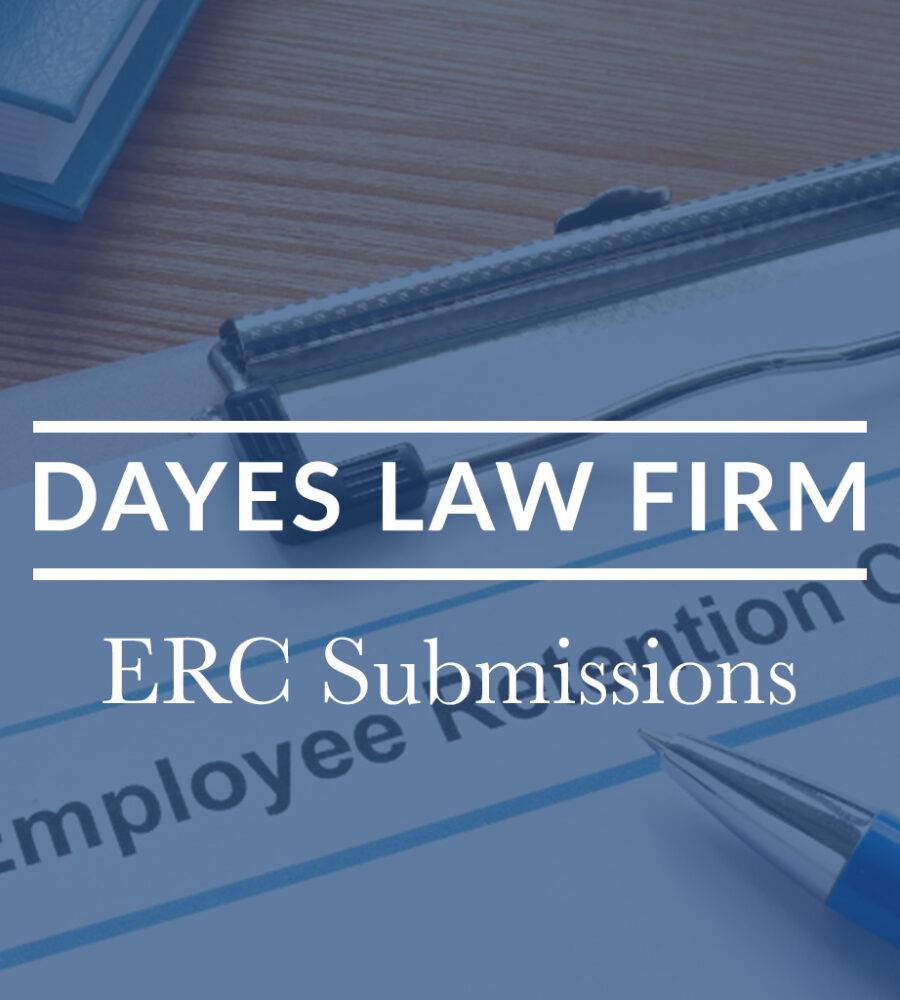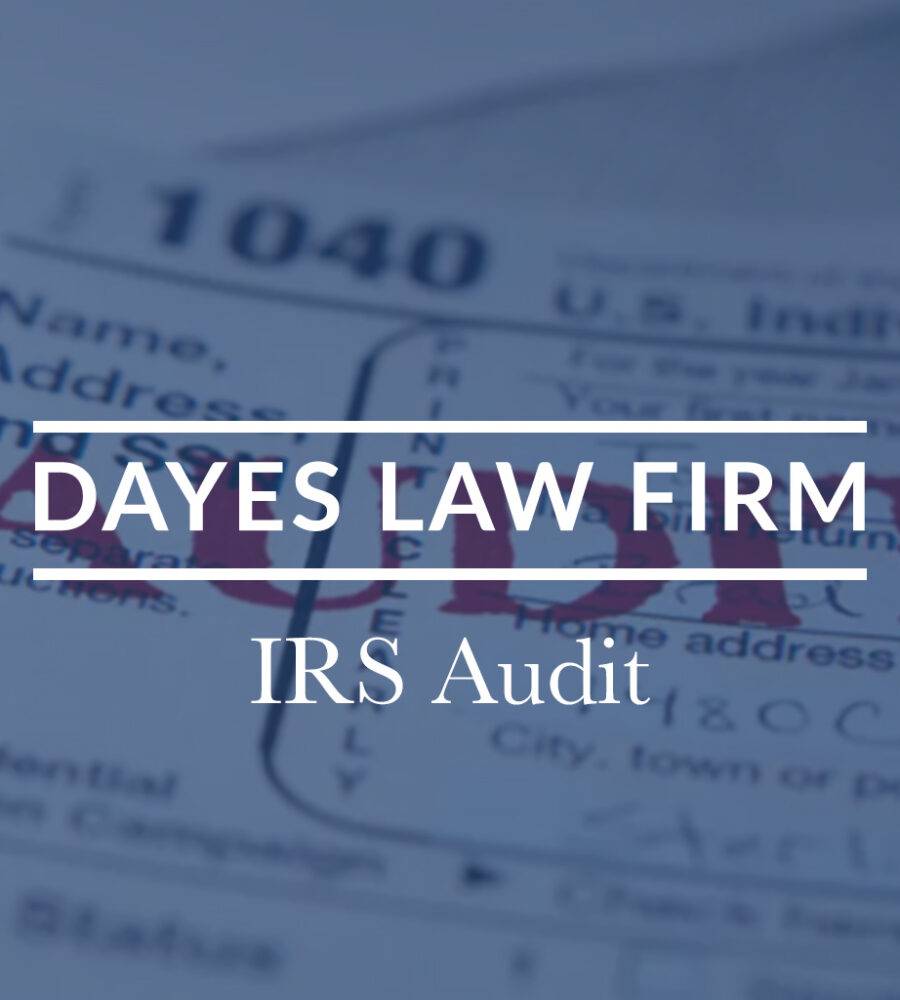Refund Actions and Second Looks
Maximize Your ERC Benefits with Expert Refund Actions and Second Looks
Ensuring you receive the full benefit of the Employee Retention Credit (ERC) can be challenging, especially if your initial claim was denied or underpaid. At Dayes Law Firm, our team of attorneys will assist you in ERC refund actions and second looks, helping businesses recover the full amount they are entitled to. Our experienced tax attorneys provide comprehensive support to optimize your ERC claims and secure your refunds.
Fill out the form below for your Free Consultation!
Free Consultation
Why Choose Us?
Experienced Tax Professionals: Our team consists of seasoned tax attorneys and experts with in-depth knowledge of ERC regulations and refund processes. We stay updated with the latest IRS guidelines to ensure your claims are accurately reviewed and optimized.
Personalized Solutions: We understand that each business has unique circumstances. We tailor our approach to fit your specific needs, ensuring your ERC claims are thoroughly reviewed and accurately recalculated.
Comprehensive Support: From initial assessment to final resolution, we handle every aspect of the ERC refund process, providing expert guidance and support throughout.
Proven Results: Our commitment to excellence and client satisfaction drives us to deliver successful outcomes. We work diligently to recover your overpaid taxes and secure your ERC refunds.
The IRS is increasingly vigilant in identifying and targeting abusive Employee Retention Tax Credit (ERTC) claims. To combat fraud, they employ a range of strategies, including scrutinizing claims for inconsistencies, conducting thorough audits, and leveraging advanced data analytics to detect patterns indicative of fraudulent activity.
They also investigate businesses that submit excessive or inflated claims, closely examining the documentation and eligibility criteria used to support these claims. Penalties for abusive ERTC claims can be severe, including fines and potential criminal charges, highlighting the importance of accurate and honest reporting.
What are ERC Refund Actions and Second Looks?
ERC Refund Actions: If your ERC claim was denied or underpaid, you have the right to take legal action to recover the full amount you are entitled to. This may involve filing an amended return, submitting a claim for refund, or taking legal action if the claim is denied.
Second Looks: A second look involves a thorough review and reassessment of your initial ERC claims to identify any errors or missed opportunities. This process ensures that you maximize your credits and receive all the refunds you are eligible for.
Our ERC Refund Actions and Second Looks Services
Initial Consultation and Assessment: We begin with a detailed review of your initial ERC claims and the IRS’s determination to identify any discrepancies or areas for improvement.
Document Preparation: Our attorneys assist in gathering and preparing all necessary documentation to support your refund claim, including payroll records, financial statements, and other relevant documents.
Claim Recalculation: We meticulously recalculate your ERC to ensure you claim the maximum credit available. Our calculations are based on the latest IRS guidelines and regulations.
Refund Request Submission: We handle the submission of your ERC refund request to the IRS, ensuring all forms and documents are accurately completed and submitted in a timely manner.
Legal Action: If necessary, we take legal action to recover your ERC refunds. Our experienced litigators will represent you throughout the legal process, presenting a compelling case on your behalf.
Ongoing Monitoring: We provide continuous monitoring and follow-up to ensure your refund request is processed efficiently. We handle any IRS inquiries or additional documentation requests on your behalf.
Audit Support: In the event of an IRS audit, we offer expert representation and support. We help you respond to IRS inquiries and defend your ERC claims, ensuring a smooth audit process.
Questions? Dayes Law Firm Has The Answers
You might consider revisiting your ERTC claim if you believe there were errors or omissions in your initial claim, if you’ve received new information that impacts your eligibility, or if you’ve discovered potential opportunities to maximize your credit.
Common reasons for revisiting an ERTC claim include identifying additional eligible wages, reassessing eligibility criteria, correcting errors on previously filed forms, or exploring retroactive claiming options for unclaimed credits.
To initiate a second look at your ERTC claim, review your original claim and supporting documentation to identify any discrepancies, errors, or missed opportunities. You may need to consult with a tax professional for guidance on specific issues or complex situations.
Gather all relevant documentation related to your ERTC claim, including records of eligible wages, documentation of business operations, evidence of significant declines in gross receipts, and any other documentation supporting your eligibility for the credit.
The deadline for revisiting an ERTC claim or filing an amended return depends on various factors, including the specific circumstances and the applicable statute of limitations. Generally, eligible employers have up to three years from the due date of the original return or the date the return was filed to make adjustments.
If you’ve already received a refund based on your initial ERTC claim but later discover errors or missed opportunities, you may need to repay any excess amount received or claim additional credits through an amended return, depending on the circumstances.



